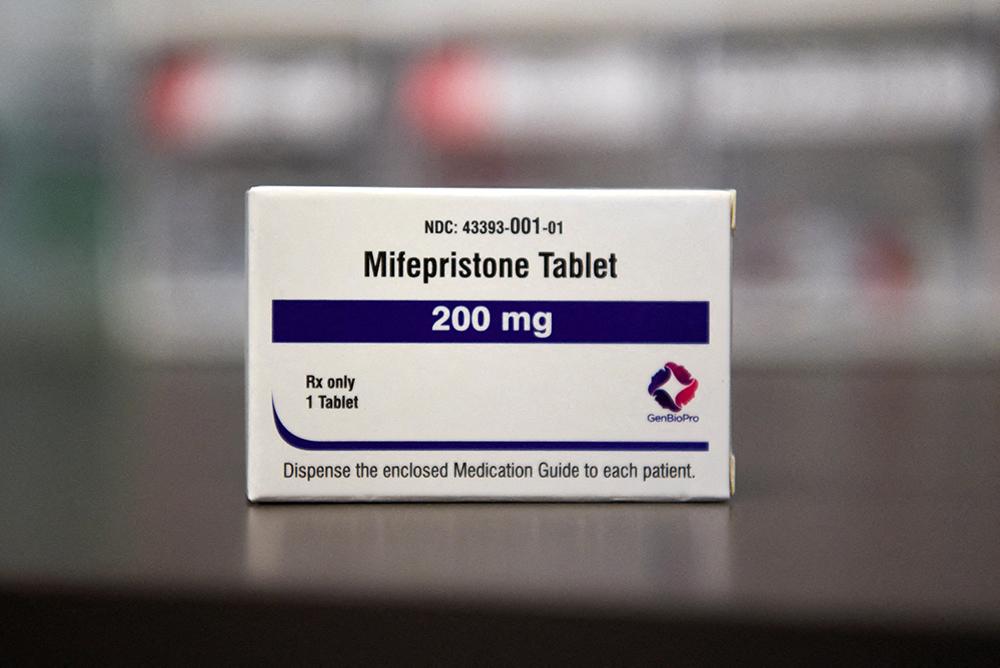
WASHINGTON — A federal appeals court Aug. 16 ruled that access to the abortion drug mifepristone should be restricted because the federal government did not follow proper procedures when it modified regulations to make the pill more available.
The drug’s availability will not currently change since there is ongoing litigation about it and the final decision will likely have to come from the Supreme Court, possibly in its next term.
The Justice Department said it will appeal this latest decision by the panel of judges of the 5th U.S. Circuit Court of Appeals in New Orleans which partially upheld a lower-court’s ruling saying the drug should have limited availability.
The appeals court was reviewing a ruling from the spring by U.S. District Court Judge Matthew Kacsmaryk in Amarillo, Texas, from a lawsuit filed by the group Alliance for Hippocratic Medicine on behalf of itself and member groups such as the Catholic Medical Association, the Christian Medical and Dental Associations, and others that are pro-life.
The group, represented by Alliance Defending Freedom, a religious liberty law firm, said the FDA used an improper process when it approved mifepristone in 2000 and did not adequately consider the drug’s safety when used by minors.
They also took issue with the FDA’s recent elimination of safeguards for mifepristone’s use by allowing the drug to be provided through the mail, which it claims violates federal law. Earlier this year, the FDA also approved the sale of mifepristone through pharmacies that receive FDA certification.
Mifepristone, also known as RU-486, is the first of a two-drug regimen used to end a pregnancy in its early stages — through 10 weeks gestation. It is often described as a medication abortion pill.
According to the Guttmacher Institute, which conducts research on abortion and reproductive health, medication abortions accounted for 54% of all abortions in the U.S. in 2022.
A brief for the initial case filed by the American Medical Association and other medical groups said if the court reverses mifepristone’s FDA approval, it would cause “profound and irreparable harm to patients across the country.”
It also said the plaintiffs took a position “that is fundamentally ideological, not scientific.”
Erik Baptist, senior counsel of Alliance Defending Freedom, said in a statement that the “FDA’s approval of chemical abortion drugs has always stood on shaky legal and moral ground, and after years of evading responsibility, it’s time for the government to do what it’s legally required to do: protect the health and safety of vulnerable women and girls.”
Erin Hawley, the lead attorney with Alliance Defending Freedom, told reporters after the appeals court decision that she was “very pleased” the court “rightly required the FDA to do its job and to restore crucial safeguards for women and girls.” She also said she hopes the decision discourages use of the abortion pills even while a final decision remains on hold, saying it “gives women a reason to think twice about taking mifepristone unsupervised.”
The three-judge panel said the doctors were right to file suit because they might have to treat a patient who has taken the pills and needs care.
Judge James Ho said he would have invalidated the FDA’s initial approval of the drug and believes the agency’s decisions are subject to review by the courts, just like decisions of any other agency.
“The scientists at the FDA deserve our respect and our gratitude, but not our blind deference,” he wrote.
Judges Jennifer Walker Elrod and Cory Wilson, rejected the groups’ challenge to the original 2000 FDA approval of mifepristone, saying it was too late to sue the agency.
But the three judges sided with the challenge to the FDA’s actions in later years to lift restrictions on who could obtain the pills saying this was “arbitrary and capricious.” The judges also said the FDA didn’t adequately study the risks of doing away with the requirement that patients have an in-person visit with a physician.
“In loosening mifepristone’s safety restrictions, FDA failed to address several important concerns about whether the drug would be safe for the women who use it,” the opinion said.
Ho was also the only judge on the panel to agree with the challengers’ argument that mail delivery of abortion pills is illegal under the Comstock Act — a law passed by Congress in 1873 which banned the mailing of “indecent” materials such as pornography but also birth control and abortion-inducing drugs.
Leaders of the U.S. Conference of Catholic Bishops have been vocal in their opposition to the abortion drug since it was first given FDA approval. They echoed objections in 2016 when the FDA relaxed rules for its use, saying it could be administered with fewer visits to a doctor, and they also objected earlier this year when the FDA announced it was allowing some retail pharmacies to distribute the drug.
Earlier this year, pro-life leaders applauded the ruling by the Texas judge to restrict access to mifepristone. “This decision shines a light on something that the Biden administration wants to sweep under the rug — that these drugs do not treat or cure disease but kill unborn children and expose their mothers to dangerous side effects. The FDA should be in the business of ensuring safety, not in taking lives,” said Carol Tobias, president of National Right to Life.
